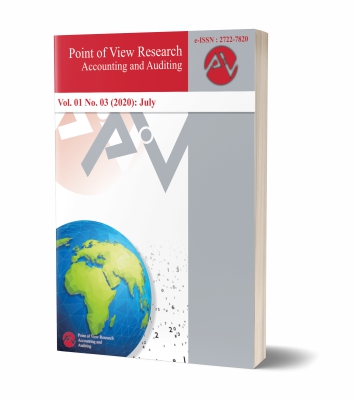Influences of tax sanctions, taxpayers awareness and social norms on motivation to meet tax obligation
Abstract
This research is done with the aim to analyze tax sanctions, taxpayers awareness and social norms to meet tax obligation in the KPP Pratama South Makassar. The Research methods used in this study are descriptive analysis double regression analysis with a total sample of 79 respondence. The result showed tax sanction, taxpayers awareness and social norms were positive and significant for the taxpayer’s motivation to fulfill its tax obligation at KPP Pratama South Makassar
Downloads
References
Allingham, M. G., & Sandmo, A. (1972). Income tax evasion: A theoretical analysis. Journal of public economics, 1(3-4), 323-338.
Alm, J., Bahl, R., & Murray, M. N. (1990). Tax structure and tax compliance. The Review of Econom-ics and Statistics, 603-613.
Alm, J., Jackson, B. R., & McKee, M. (1992). Estimating the determinants of taxpayer compliance with experimental data. National Tax Journal, 107-114.
Alm, J., & Martinez-Vazquez, J. (2003). Institutions, paradigms, and tax evasion in developing and transition countries.
Alm, J. (2012). Measuring, explaining, and controlling tax evasion: lessons from theory, experiments, and field studies. International tax and public finance, 19(1), 54-77.
Alm, J., & McClellan, C. (2012). Tax morale and tax compliance from the firm's perspective. Kyklos, 65(1), 1-17.
Alm, J., & Finlay, K. (2013). Who benefits from tax evasion?. Economic Analysis and Policy, 43(2), 139-154.
Beck, P. J., Davis, J. S., & Jung, W. O. (1991). Experimental evidence on taxpayer reporting under un-certainty. Accounting Review, 535-558.
Becker, G. S. (1968). Crime and punishment: An economic approach. In The economic dimensions of crime (pp. 13-68). Palgrave Macmillan, London.
Berkowitz, A. D. (2004). The social norms approach: Theory, research, and annotated bibliography.
Bott, K. M., Cappelen, A. W., Sørensen, E. Ø., & Tungodden, B. (2019). You’ve got mail: A random-ized field experiment on tax evasion. Management Science.
Boyer, P. C., Dwenger, N., & Rincke, J. (2016). Do norms on contribution behavior affect intrinsic mo-tivation? field-experimental evidence from germany. Journal of Public Economics, 144, 140-153.
Cahyonowati, Nur; Ratmono, Dwi & Faisal. (2012). Peranan Etika, Pemeriksaan, Dan Denda Pajak Un-tuk Meningkatkan Kepatuhan Wajib Pajak Orang Pribadi. Journal Akuntansi dan Keuangan Indo-nesia, Volume 9, no. 2.
Castro, L., & Scartascini, C. (2015). Tax compliance and enforcement in the pampas evidence from a field experiment. Journal of Economic Behavior & Organization, 116, 65-82.
Chung, J., & Trivedi, V. U. (2003). The effect of friendly persuasion and gender on tax comliance be-havior. Journal of Business Ethics, 47(2), 133-145.
Cialdini, R. B., Kallgren, C. A., & Reno, R. R. (1991). A focus theory of normative conduct: A theoreti-cal refinement and reevaluation of the role of norms in human behavior. In Advances in experi-mental social psychology (Vol. 24, pp. 201-234). Academic Press.
Drago, D., Di Tommaso, C., & Thornton, J. (2017). What determines bank CDS spreads? Evidence from European and US banks. Finance Research Letters, 22, 140-145.
Doerrenberg, P., Peichl, A., & Siegloch, S. (2017). The elasticity of taxable income in the presence of deduction possibilities. Journal of Public Economics, 151, 41-55.
Dwenger, N., Kleven, H., Rasul, I., & Rincke, J. (2016). Extrinsic and intrinsic motivations for tax compliance: Evidence from a field experiment in Germany. American Economic Journal: Econom-ic Policy, 8(3), 203-32.
Frey, B. S., & Jegen, R. (2001). Motivation crowding theory. Journal of economic surveys, 15(5), 589-611.
Hallsworth, M., List, J. A., Metcalfe, R. D., & Vlaev, I. (2017). The behavioralist as tax collector: Using natural field experiments to enhance tax compliance. Journal of public economics, 148, 14-31.
Hanno, D. M., & Violette, G. R. (1996). An analysis of moral and social influences in tax compliance. Behavioral Research in Accounting, 8, 57-75.
Holler, M., Hoelzl, E., Kirchler, E., Leder, S., & Mannetti, L. (2008). Framing of information on the use of public finances, regulatory fit of recipients and tax compliance. Journal of Economic Psycholo-gy, 29(4), 597-611.
Jackson, B. R., & Milliron, V. C. (1986). Tax compliance research: Findings, problems, and prospects. Journal of accounting literature, 5(1), 125-165.
Kleven, H. J., Knudsen, M. B., Kreiner, C. T., Pedersen, S., & Saez, E. (2011). Unwilling or unable to cheat? Evidence from a tax audit experiment in Denmark. Econometrica, 79(3), 651-692.
Kohlberg, L. (1969). Stages and Sequences: The Cognitive Development Approach to Socialization. da-lam D. Goslin (ed.). Handbook of Socialization Theory and Research. Chicago: Rand McNally.
Lerche, D. (1980). Efficiency of taxation in Indonesia. Bulletin of Indonesian Economic Studies, 16(1), 34-51.
Luttmer, E. F., & Singhal, M. (2014). Tax morale. Journal of economic perspectives, 28(4), 149-68.
Milgram, S., Bickman, L., & Berkowitz, L. (1969). Note on the drawing power of crowds of different size. Journal of personality and social psychology, 13(2), 79.
Mutia, S. P. T. (2014). Pengaruh Sanksi Perpajakan, Kesadaran Perpajakan, Pelayanan Fiskus, Dan Tingkat Pemahaman Terhadap Kepatuhan Wajib Pajak Orang Pribadi (Studi Empiris pada Wajib Pajak Orang Pribadi yang terdaftar di KPP Pratama Padang). Jurnal Akuntansi, 2(1).
Mohdali, R., Isa, K., & Yusoff, S. H. (2014). The impact of threat of punishment on tax compliance and non-compliance attitudes in Malaysia. Procedia-Social and Behavioral Sciences, 164, 291-297.
Park, C. G., & Hyun, J. K. (2003). Examining the determinants of tax compliance by experimental data: A case of Korea. Journal of Policy Modeling, 25(8), 673-684.
Perkins, H. W., & Berkowitz, A. D. (1986). Perceiving the Community Norms of Alcohol Use among Students: Some Research Implications for Campus Alcohol Education Programming*. Substance Use & Misuse, 21(9-10), 961–976.
Pomeranz, D. (2015). No taxation without information: Deterrence and self-enforcement in the value added tax. American Economic Review, 105(8), 2539-69.
Puri, K. A. (2014). Pengaruh Kesadaran Wajib Pajak, Pelayanan Fiskus, Dan Sanksi Pajak Terhadap Kepatuhan Wajib Pajak Orang Pribadi Yang Melakukan Kegiatan Usaha Dan Pekerjaan Bebas (Studi Kasus pada KPP Pratama Surakarta) (Doctoral dissertation, Universitas Muhammadiyah Su-rakarta).
Rahmawati, S. Y., & Qomariyah, N. (2006). Pengaruh Informasi Asimetri Terhadap Praktik Manajemen Laba Pada Perusahaan Perbankan Publik Yang Terdaftar di Bursa Efek Jakarta. Prosiding Simpo-sium Nasional Akuntansi.
Redae, R. B., & Sekhon, S. (2016). Taxpayers’ knowledge and tax compliance behavior in Ethiopia: A study of Tigray State. International Journal of Management and Commerce Innovations, 3(2), 1090-1102.
Sandmo, A. (2005). The theory of tax evasion: A retrospective view. National tax journal, 643-663.
Slemrod, J., Blumenthal, M., & Christian, C. (2001). Taxpayer response to an increased probability of audit: evidence from a controlled experiment in Minnesota. Journal of public economics, 79(3), 455-483.
Slemrod, J. (2004). The economics of corporate tax selfishness (No. w10858). National bureau of eco-nomic research.
Soemarso, S. R. (1998). Dampak Reformasi Perpajakan 1984 Terhadap Efisiensi Sistem Perpajakan Indonesia. Economics and Finance in Indonesia, 46, 333-366.
Suhardito, Bambang dan Sudibyo, Bambang, 1999, Pengaruh Faktor-faktor yang Melekat pada Wajib Pajak terhadap Keberhasilan Penerimaan Pajak Bumi dan Bangiman, Simposium Nasional Akuntansi, SNA 11:114.
Syamsuriana, N., Nasaruddin, F., Suun, M., & Ahmad, H. (2019). Dampak Perilaku Altruisme, Moral Reasoning dan Kecerdasan Emosional Terhadap Kualitas Audit. ATESTASI: Jurnal Ilmiah Akuntansi, 2(2), 98-110.
Tiraada, T. A. (2013). Kesadaran perpajakan, sanksi pajak, sikap fiskus terhadap kepatuhan wpop di kabupaten minahasa selatan. Jurnal EMBA: Jurnal Riset Ekonomi, Manajemen, Bisnis dan Akuntansi, 1(3).
Torgler, B., Schaffner, M., & Macintyre, A. (2007). Tax compliance, tax morale and governance quality (No. 2007-17). CREMA Working Paper.
Torgler, B. (2013). A field experiment in moral suasion and tax compliance focusing on underdeclara-tion and overdeduction. FinanzArchiv/Public Finance Analysis, 393-411.
Venkatesan, M. (1966). Experimental study of consumer behavior conformity and independence. Jour-nal of marketing research, 3(4), 384-387.
Wexley, K. N., & Yukl, G. A. (1984). Organizational behavior and personnel psychology. Richard D. Irwin.
Wibowo, W. (2018). Joint Audit Ditjen Pajak dan Ditjen Bea dan Cukai: Analisis Faktor-Faktor Pemam-pu Kerja Sama dan Pertukaran Informasi. Universitas Gadjahmada.
Witte, A. D., & Woodbury, D. F. (1985). The effect of tax laws and tax administration on tax compli-ance: The case of the US individual income tax. National Tax Journal, 1-13.
Winardi, J. (2002). Motivasi dan pemotivasian dalam manajemen. Jakarta: PT. Raja Grafindo Persada
Copyright (c) 2020 Point of View Research Accounting and Auditing

This work is licensed under a Creative Commons Attribution 4.0 International License.






.png)









